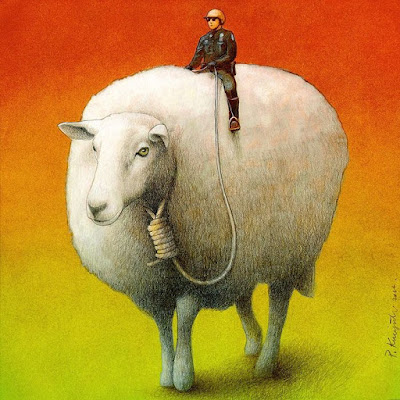JESUS SHEPHERD FOR THE ABANDONED SHEEP.
July 18, 2021.
Sixteenth Sunday in Ordinary Time – B.
A British proverb says: “God gives his anger by weight, but
his pity without measure.” And a Bayombe proverb adds: “A wrong step by the
leader is a warning for those following.”
Sheep without a shepherd are easy prey for a wild beast.
When shepherds forget or resign from their primary task which is to take care
of their sheep, these run the danger of getting lost, disoriented, in permanent
danger.
God has not created us to be lost sheep. But regrettably,
the leaders to whom we are entrusted had dismission from their task. Therefore,
the flock is at lost, erring in the lonely deserts of this life in search of
comfort, consolation, and security. Where then will they find that comfort? The
Lord himself promises to be the new leader of his sheep. He will be the one to
care for them, lead them, and protect them. He will be their perfect and good
shepherd, not like those they had before.
Speaking of the good shepherd, the Catechism says, “The Good
Shepherd ought to be the model and "form" of the bishop's pastoral
office. Conscious of his own weaknesses, "the bishop . . . can have
compassion for those who are ignorant and erring. He should not refuse to
listen to his subjects whose welfare he promotes as of his very own
children.... the faithful ... should be closely attached to the bishop as the
Church is to Jesus Christ, and as Jesus Christ is to the Father" CCC. 896.
Today's word of God, with the tune given by the first
reading, is a satire to all those placed in charge of God's flock as shepherds.
Through the Prophet Jeremiah, the Lord makes a judgment to the leaders of his
people and accuses them. They have forsaken Israel and led him to its loss. So,
the Lord God accuses, "Woe to the shepherds who mislead and scatter the
flock of my pasture." Against them, he promises a severe judgment. But the
Lord does not limit only in accusing and condemning the misconduct of the
leaders, he also makes a promise, he himself will take the lead of his people.
Israel will have a new shepherd different from the previous ones. Thus says the
Lord, “I myself will gather the remnant of my flock from all the lands to which
I have driven them and bring them back to their meadow; there they shall
increase and multiply. I will appoint shepherds for them who will shepherd them
so that they need no longer fear and tremble, and none shall be missing…” Those
news shepherds will lead the people according to the heart and will of God,
with love, compassion, mercy. Thus, the Psalmist can sing, “the Lord is my
shepherd; there is nothing I shall want.”
In the Gospel, the Lord Jesus teaches us that one of the
greatest attributes and characteristics of a “Good Leader” is his sense of
compassion. It is all about feeling concerned for others and letting one’s
heart be moved with pity for them. Two times we can feel that sense of
compassion and care for others in today’s excerpt of St. Mark. To the Disciples
back from their first missionary exposure, the Lord says, “Come away by
yourselves to a deserted place and rest awhile.” He knows that it has not been
an easy task for them, first because of the journey, but also of all that they
were reporting, even though happily. They need to rest and refresh. Only a good
leader can see and feel the need of his subjects and give them the rest they
need. The second expression of compassion is when he sees the people. Mark
mentions that “his heart was moved with pity for them, for they were like sheep
without a shepherd.” The Lord cannot stand indifferent in front of people in
need. No matter the project he had for himself and his disciples, he forgot
about all these and starting serving the spiritual and corporal need of the
abandoned crowd.
Our God is a good and compassionate shepherd for us, his
lovely flock. And because of that compassion he has for us, he wants us to be
united. In Christ, St. Paul says in the second reading, God “broke down the
dividing wall of enmity”, abolishing all that in the law keeps us apart from each
other, “that he might create in himself one new person in place of the two,
thus establishing peace, and might reconcile both with God, in one body,
through the cross, putting that enmity to death by it.” Jesus, our Good
Shepherd is our peace, unity, and reconciliation. Through his death on the
cross, he won for us salvation and brought us comfort and compassion. Paul
underlines here the great work of the New Shepherd, Christ. He created a
perfect unity among Jews and Gentiles by his blood poured on the Cross. He made
them one body in the unique community, the Church, the flock of God.
As bishops, pastors, priests, and leaders of the people of
God, our main task should be to search for that unity in our community and
religious groups. As “Ekklesia”, we are the household of God, the holy temple,
the body of Christ. As such, unity, mutual concern, compassion, and love should
be our strong foundations.





Comments
Post a Comment